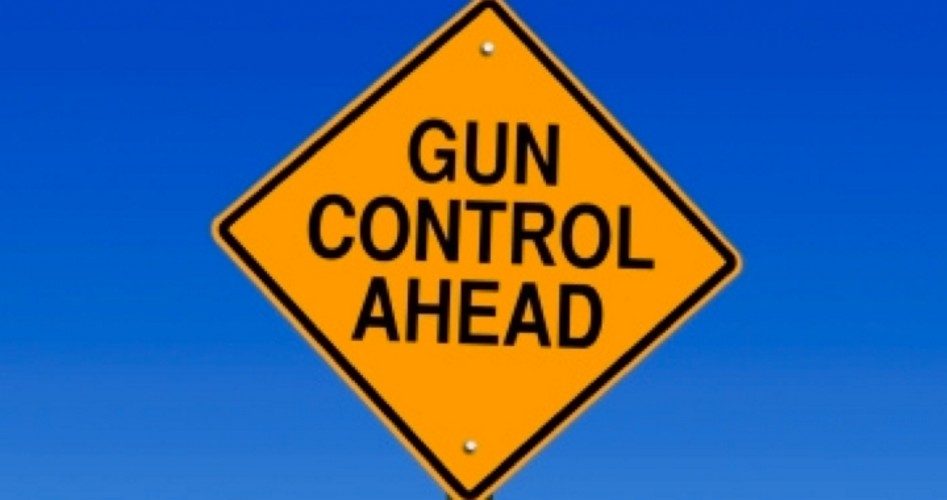
As noted in the recently released Unified Agenda (the list of rules and regulations that federal agencies are developing), the Department of Justice is putting the finishing touches on more than a dozen restrictions and infringements of the Second Amendment to be effective by November. They include limitations on high-powered pistols that have recently come onto the market that fire high-velocity .223 caliber rounds, and expansions of the criteria for people who do not “qualify” for the right to own a firearm, including those convicted of domestic abuse and others determined to be “mentally unstable.”
These planned restrictions are in keeping with the president’s continuing war against the Second Amendment, framing them as a way to reduce mass murders. Following the massacre in Newtown, Connecticut, President Obama said, “If America worked harder to keep guns out of the hands of dangerous people, there would be fewer atrocities like the one that occurred in Newtown.”
The president failed to mention that no laws, present or proposed, would have kept that shooter from attacking innocents. Luke O’Dell, vice president of political affairs at the National Association for Gun Rights (NAGR), saw through the façade, declaring, “It’s clear President Obama is beginning his final assault on our Second Amendment rights by forcing his anti-gun agenda on honest law-abiding citizens through executive force.”
This is the president’s end-run around failures of the ATF to ban ammunition (that resulted in the retiring of its director, Todd Jones, in March) and of members of Congress to accomplish the same thing. Following those failures, Rep. Bonnie Watson Coleman (D-N.J.) offered her Stop Online Ammunition Sales Act of 2015. If enacted it would not only have banned online ammunition sales, it would also effectively have eliminated person-to-person sales of ammunition as well. All such sales would have had to take place in front of a dealer with a federal firearms license who would then have recorded the identities of the parties, the ammunition involved, and reported to federal authorities any sales of more than 1,000 rounds.
Rep. Lois Capps (D-Calif.) pushed for her Protecting Domestic Violence and Stalking Victims Act, which would have expanded the types of low-level misdemeanor convictions that would lead to permanent prohibitions on the ownership and possession of firearms. That bill also contained a retroactive provision that would extend those prohibitions to include convictions before the bill was passed, creating thousands of newly-minted federal firearms felons whose right to keep and bear arms would have been neatly and immediately extinguished.
The failure of bills such as these has given the president an excuse to use agencies in the executive branch to issue regulations to accomplish many of the same things, but without the messy necessity of having to follow the Constitution.
Article I, Section 1 of that Constitution reads simply, “All legislative powers herein granted shall be vested in a Congress of the United States, which shall consist of a Senate and House of Representatives.” One searches in vain for any reference to executive branch authority to make rules or laws or regulations, and certainly no authority for the Justice Department (or the ATF) to issue such rules.
The Second Amendment to that Constitution, intended to apply to the federal government, provides that “A well-regulated militia, being necessary to the security of a free state, the right of the people to keep and bear arms, shall not be infringed.”
The true meaning of the Second Amendment is made clear with this helpful transliteration: “A well-educated citizenry, being necessary to the culture of a free state, the right of the people to keep and read books, shall not be infringed.”
So even if Congress did pass bills similar to those mentioned, they would still be unconstitutional and therefore null and void. When the president pontificated following the Newtown massacre with this: “We can respect the Second Amendment while keeping an irresponsible law-breaking few from inflicting harm on a massive scale,” Tim Brown, writing at Freedom Outpost, declared:
No, Mr. Obama, you cannot. As soon as you [issue] executive orders on a subject which you have not been given authority over, you are not respecting the Second Amendment.
You are breaking the law, and as such, you should be impeached [and] then charges brought against you for breaking the law and a just punishment rendered.
Protestations by pro-gun officials that the new regulations might negatively impact “a person who spanked his kid, or yelled at his wife, or slapped her husband” miss the point. Protestations that such new regulations would be “unfair” and would have no impact on criminal behavior miss the point. Protestations that expanding the definitions of mental illness would keep those needing help from seeking it also miss the point.
The point is that the executive branch has no business, under the Constitution, issuing such directives, while the executive branch, under the Second Amendment, has no business infringing on precious rights. Decisions such as these are to be considered and handled at the state level.
It’s wise to keep the main thing the main thing. Complaining that executive orders, administrative decrees, and congressional overreach are unfair, discriminatory, and ineffective in reducing crime are side issues. At risk is the acceptance of federal mandates and restrictions in areas where they have no place at all under the Constitution.
A graduate of an Ivy League school and a former investment advisor, Bob is a regular contributor to The New American magazine and blogs frequently at www.LightFromTheRight.com, primarily on economics and politics. He can be reached at [email protected].



